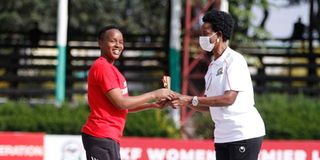Kenya desperately needs strong advocates of women football

Thika Queens goalkeeper Monica Karambu (left) receives best goalkeeper award trophy from Football Kenya Federation Women Representative Margaret Omondi at ASK grounds in Nakuru on June 27, 2021.
What you need to know:
- Believe it or not, there is a woman who sits on the FKF National Executive Committee, elected by delegates to ensure that the issues of local women footballers are listened to
- Despite being the top woman in the federation, Margaret Omondi ‘s voice has never been heard
- Kenyan football is in urgent need of dedicated advocates, like Ghana's Black Queens coach Mercy Tagoe-Quarcoo
It doesn’t matter from which angle you look at it. A 7-2 loss for Kenya to Uganda is simply embarrassing. Yet that is what happened last Friday when our Starlets went up against the Crested Cranes in the Fifa Under-20 Women’s World Cup qualifier.
As we had reported on Nation Sport, the Kenyan team been assembled just one week before the game. Yet they were tackling a team that had been in camp for more than a month. One wonders whether the result was a surprise to anyone within the team or technical bench.
Which brings us to this sticky question: How effective are the women that serve on the boards of national FAs and Caf in pushing the women’s football agenda?
Believe it or not, there is a woman who sits on the FKF National Executive Committee, elected by delegates to ensure that the issues of local women footballers are listened to. When this post was created, many had hopes that finally, the state of women’s football was about to turn a corner, but alas! Two years into her tenure and the script remains unchanged, and the results have begun telling the real story.
Despite being the top woman in the federation, Margaret Omondi ‘s voice has never been heard. Not when the league winners received a pat on the back and a paltry Sh350,000 as cash prize. Not when the women went a whole year without playing any competitive match as their male counterparts continued competing and returning average results. And certainly not when the women’s junior team was given such shoddy preparations ahead of the World Cup qualifier.
Such developments only confirm our earlier suspicions. Football governance is one big mafia. Once you get in, you have to either conform or become part of the system. You don’t get to use your head. Once you are seen as a rebel, your days are numbered.
I was chatting with colleagues from Ghana and Nigeria the other day and they confirmed that it is not a Kenyan problem, women in executive positions in Caf and many federations either don’t know how to use their voices, or are too scared to do so.
They have no courage to say “go to hell”. Once they enter, they behave exactly like their male colleagues. They begin to enjoy the trappings of the positions, and when they realise speaking out will cost them their seats, they choose to ignore their mandate. The mafia machine seems to be winning everywhere!
Women’s football stakeholders who looked up to the occupant of the NEC woman representative as the saviour now know that it was all wishful thinking. Generally, football cannot reform itself, it needs disruption from powerful external forces. No one person can change things at FKF. But a responsible government can do that. Had the US not wielded the big stick, the grand corruption at Fifa would have continued.
Kenyan football is in urgent need of dedicated advocates, like Ghana's Black Queens coach Mercy Tagoe-Quarcoo, who recently slammed the Ghana Football Association’s behavior and attitude towards the development of women’s football in the country. “You are sleeping and joking,” is how she described her country’s football custodians.




